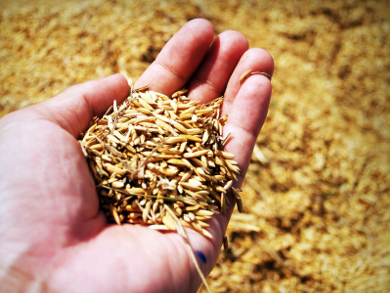Too much cold or heat can have a negative effect on crop yields, and thus on food prices and availability. Climate change causes a rise in high temperature episodes. These high temperatures (defined as above 30 °C) can cause a lack of water or direct damage to plants.
Bernhard Schauberger, Potsdam Institute for Climate Impact Research (PIK), Germany, and colleagues have combined nine different crop models and performed statistical analyses. The team found that the models were able to reproduce the observed effects of heat on plants such as maize, soybean, and wheat in the United States. With rain as the only source of irrigation, each day with temperatures over 30 °C reduces yields of maize and soybean by up to 6 %. Wheat yield is not affected since wheat grows during seasons where high temperatures rarely occur.
The models suggest that the reduced crop yields are mainly caused by water stress and that additional irrigation can prevent losses. Elevated CO2 levels in the atmosphere are one cause of climate change, and plants convert CO2 to biomass during their growth process. However, the team’s models predict that rising CO2 levels do not significantly improve yields and cannot offset the losses caused by higher temperatures.
- Consistent negative response of US crops to high temperatures in observations and crop models,
Bernhard Schauberger, Sotirios Archontoulis, Almut Arneth, Juraj Balkovic, Philippe Ciais, Delphine Deryng, Joshua Elliott, Christian Folberth, Nikolay Khabarov, Christoph Müller, Thomas A. M. Pugh, Susanne Rolinski, Sibyll Schaphoff, Erwin Schmid, Xuhui Wang, Wolfram Schlenker, Katja Frieler,
Nat. Commun. 2017, 8, 13931.
DOI: 10.1038/ncomms13931




